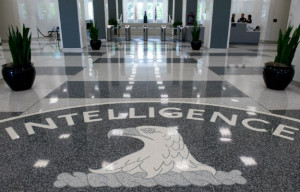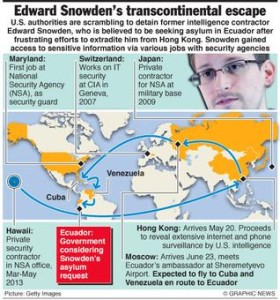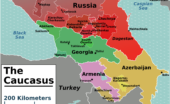Re Ian Bremmer 'Could third-party candidates upend the 2024 US election?' 3 April The current political movement in the USA…
E is for Espionage and Edward Snowden
Written by Diana Thebaud Nicholson // May 13, 2014 // Government & Governance // 3 Comments
Dr. Charles Cogan: Coming on a Year After the Snowden Revelations, the Germans Are Still Less Than Satisfied with the U.S.
(HuffPost) In his joint appearance with Ms. Merkel on May 5, President Obama asserted that, “We do not have a blanket no-spy agreement with any country.” This may be strictly speaking true. Note that the British-U.S. Communications Intelligence Agreement of March 5, 1946, which became the basis for the so-called “five eyes” system (the U.S., U.K., Canada, Australia and New Zealand) deals only with the sharing of signals intelligence and says nothing about an agreement not to spy on each other.
Nevertheless there appears to be an informal or tacit agreement among the above anglo-saxon countries not to spy on each other. In 1984, when I was on a visit to London I had the more than distinct impression that unilateral intelligence operations in Britain were off the table.
18 April
Vladimir Putin must be called to account on surveillance just like Obama
(The Guardian) I questioned the Russian president live on TV to get his answer on the record, not to whitewash him
• Edward Snowden defends decision to question Putin
I was surprised that people who witnessed me risk my life to expose the surveillance practices of my own country could not believe that I might also criticise the surveillance policies of Russia, a country to which I have sworn no allegiance, without ulterior motive.
17 April
After a long hiatus. he resurfaces – pathetic!
Sorry, Snowden: Putin Lied to You About His Surveillance State—And Made You a Pawn of It
(The Daily Beast) In a bizarre televised appearance the NSA whistleblower now resident in Russia asked Putin if he spied on his own citizens the way the Americans do on theirs. Putin, predictably, said no.
26 January
Edward Snowden: There Are ‘Significant Threats’ To My Life
(Reuters) – Former U.S. National Security Agency contractor Edward Snowden told German TV on Sunday about reports that U.S. government officials want to assassinate him for leaking secret documents about the NSA’s collection of telephone records and emails.
In what German public broadcaster ARD said was Snowden’s first television interview, Snowden also said he believes the NSA has monitored other top German government officials along with Chancellor Angela Merkel.
Snowden told ARD that he felt there are “significant threats” to his life but he said that he nevertheless sleeps well because he believes he did the right thing by informing the public about the NSA’s activities Here is the link to the interview
20 January
Edward Snowden ‘may have been working with Russia’
(BBC) US intelligence leaker Edward Snowden may have collaborated with Russia, the chairman of the US House Intelligence Committee has alleged.
“I believe there’s a reason he ended up in the hands, the loving arms, of an agent in Moscow,” Rep Mike Rogers told CBS’s “Face the Nation” programme.
Mr Rogers offered no firm evidence to back his theory, and the FBI is said to remain sure Mr Snowden acted alone.
3 January
Fred Kaplan: Why Snowden Won’t (and Shouldn’t) Get Clemency
He went too far to be considered just a whistleblower.
(Slate) It is true that Snowden’s revelations about the National Security Agency’s surveillance of American citizens—far vaster than any outsider had suspected, in some cases vaster than the agency’s overseers on the secret FISA court had permitted—have triggered a valuable debate, leading possibly to much-needed reforms.
If that were all that Snowden had done, if his stolen trove of beyond-top-secret documents had dealt only with the NSA’s domestic surveillance, then some form of leniency might be worth discussing.
But Snowden did much more than that. The documents that he gave the Washington Post’s Barton Gellman and the Guardian’s Glenn Greenwald have, so far, furnished stories about the NSA’s interception of email traffic, mobile phone calls, and radio transmissions of Taliban fighters in Pakistan’s northwest territories; about an operation to gauge the loyalties of CIA recruits in Pakistan; about NSA email intercepts to assist intelligence assessments of what’s going on inside Iran; about NSA surveillance of cellphone calls “worldwide,” an effort that (in the Post’s words) “allows it to look for unknown associates of known intelligence targets by tracking people whose movements intersect.” In his first interview with the South China Morning Post, Snowden revealed that the NSA routinely hacks into hundreds of computers in China and Hong Kong.
These operations have nothing to do with domestic surveillance or even spying on allies. They are not illegal, improper, or (in the context of 21st-century international politics) immoral. Exposing such operations has nothing to do with “whistle-blowing.”
2 January
The Times advances the NSA’s amnesty-for-Snowden trial balloon
(Reuters|blogs) Of course the New York Times editorial page wants clemency or, at the very least, a generous plea bargain for National Security Agency contractor turned super-leaker Edward Snowden! The news pages of the New York Times have directly benefited from top-secret leaks from Snowden to break stories since last August, when the paper acquired a cache of his NSA material from the Guardian. (The Guardian published its own “pardon for Snowden” editorial today.) In urging leniency for Snowden, the Times editorial page is urging leniency for a specific news-pages source, which the editorial doesn’t directly state. If that doesn’t define enlightened self-interest, nothing does.
The Times editorial page operates independently from the Times news operation, so I’m not suggesting that Executive Editor Jill Abramson instructed Editorial Page Editor Andrew Rosenthal what to write. But on this score, she probably didn’t even have to stifle the urge. For the last decade, the news side has been breaking stories about warrantless surveillance by the NSA, a secret bank-data surveillance program, and, via WikiLeaks, the war logs from Iraq and Afghanistan and the U.S. diplomatic cables. The editorial page has lectured the government on its overreach and incompetence in the security realm. Abramson and Rosenthal, who report to the same publisher, obviously harmonize on this score. Even if they didn’t, it’s unlikely in the extreme that a Times editorial would ever call for a Times news-side source to be seated in a Judas Cradle as punishment for leaking to the press.
2013
5 November
Brazil Admits Spying on U.S.
(WSJ via Daily Beast) Et tu, Brazil? Despite righteous indignation and a cancelled state visit to Washington, Brazil admitted Monday it spied on diplomats from the U.S., Russia, Iran and Iraq. Ironically, despite its support for Glenn Greenwald publishing leaks from Edward Snowden, the government of Brazil said that the leaked classified documents detailing its own spying were “a serious crime, which will be investigated and prosecuted under the terms of the law.” The spying, which took place a decade ago, involved trailing of diplomats, as well as documenting and monitoring activities at the U.S. embassy.
31 October
Ex-NSA man Edward Snowden gets web job in Russia
(BBC) The former US spy agency contractor will work for a major private website in Russia, where he was granted asylum after fleeing the United States.
“Edward starts work in November,” his lawyer Anatoly Kucherena told the Russian news agency RIA Novosti.
29 October
Neil Macdonald — NSA spying: The faux outrage of America’s bugged allies
“Everyone is listening to everyone else. But we don’t have the same means as the United States, which makes us jealous.”
(CBC) … President Barack Obama orders a review of America’s foreign intelligence gathering.
That review confirms certain things that, Obama’s officials are now telling reporters, the president didn’t know, such as the National Security Agency’s wiretapping of at least 35 world leaders, including German Chancellor Angela Merkel.
Obama then tells the NSA to stop bugging some of them. It’s a safe bet the review told, or will tell Obama other things he didn’t know, as well.
Had it not been for Snowden, … President Obama would probably not know about these practices he’s now reviewing and halting. …
The second tier of Western surveillance expertise comprises Israel, Sweden, Germany, Finland, Norway, Italy and France. All are proficient, say the professionals, and all spy on any target deemed to be in their national interest, whether related to security or commerce. France has long been regarded as the most adept at stealing trade secrets.
… one of the few straightforward reactions amid all the indignation over the NSA spying came from Bernard Kouchner, the former French foreign minister: “Let’s be honest, we eavesdrop too,” he told an interviewer. “Everyone is listening to everyone else. But we don’t have the same means as the United States, which makes us jealous.”
12 October
Studios Are Fighting Over Glenn Greenwald’s Snowden Book
(Atlantic Wire) Greenwald’s book, set for a March 2014 release from publisher Metropolitan Books, promises to be the definitive account of how a former NSA contractor, Edward Snowden, was able to leak damaging details of the secret spy agency’s surveillance practices. So it’s not all that surprising that 20th Century Fox, Sony Pictures Entertainment and HBO were all jockeying for the movie rights, according to The New York Times‘ Michael Ceiply. (This is likely a different project than the Snowden movie shopped by the William Morris Endeavor this summer.) Nothing is signed and delivered yet, but the official Greenwald-Snowden movie is coming.
At least one studio has already pulled out of the bidding because of the myriad legal and logistical issues that plague the telling of Greenwald’s Snowden story. The ending, really, is the project’s biggest issue. Snowden is holed up in Russia, dodging extradition from the U.S. You’ll remember that his stay is supposed to be a temporary one. We don’t know what happens next, so neither does the studio, and that could have a huge effect on the movie’s historical significance. Zero Dark Thirty wasn’t made until years after Osama bin Laden was killed. That story had a beginning, middle and end before it was made into a movie. Snowden’s is still in its second act.
11 October
The CIA Didn’t Trust Snowden, Even Back in 2009
Edward Snowden had a negative report placed in his CIA personnel file more than four years ago, but that “red flag” wasn’t enough to keep him out of the NSA’s highly classified computer network. According to a report in Friday’s The New York Times, while working as a CIA technician back in 2009, Snowden was sent home from an overseas posting due to the suspicions of supervisor — who suspected him of trying to gain unauthorized access to classified files. Yet, that didn’t stop Snowden from retaining his security clearance when he switched jobs and moved to the NSA.
At the beginning of 2013, Snowden was hired by Booz Allen Hamilton, a government contractor who put him to work for the National Security Agency. Had Booz Allen or the NSA seen Snowden’s CIA file before hiring him, it almost certainly would have affected his employment, but his tarnished record appears to have “slipped through the cracks.”
29 August
 The Washington Post revealed on Thursday one of the most closely held secrets within the U.S. government: the size of the classified intelligence budget. The document, which was provided to the paper by NSA whistleblower Edward Snowden, reveals that U.S. intelligence spending has surpassed its Cold War peak and that the CIA receives a much greater portion of funding than was previously thought.
The Washington Post revealed on Thursday one of the most closely held secrets within the U.S. government: the size of the classified intelligence budget. The document, which was provided to the paper by NSA whistleblower Edward Snowden, reveals that U.S. intelligence spending has surpassed its Cold War peak and that the CIA receives a much greater portion of funding than was previously thought.
U.S. spy network’s successes, failures and objectives detailed in ‘black budget’ summary
(WaPost) U.S. spy agencies have built an intelligence-gathering colossus since the attacks of Sept. 11, 2001, but remain unable to provide critical information to the president on a range of national security threats, according to the government’s top-secret budget.
The $52.6 billion “black budget” for fiscal 2013, obtained by The Washington Post from former intelligence contractor Edward Snowden, maps a bureaucratic and operational landscape that has never been subject to public scrutiny. Although the government has annually released its overall level of intelligence spending since 2007, it has not divulged how it uses the money or how it performs against the goals set by the president and Congress.
NSA Fears There Are 3,999 More Snowdens
(Foreign Policy) According to the Post, American intelligence agencies budgeted for a major effort in 2012 to prevent intrusions by foreign intelligence agencies and to guard against betrayals by their own employees. But most of that money was diverted into an “all-hands, emergency response” to deal with secrets disclosed by WikiLeaks. For the following year, 2013, the budget pledged that the intelligence community would carry out a “review of high-risk, high-gain applicants and contractors” — contractors like Snowden, for example. The NSA, specifically, said it would carry out a “minimum of 4,000 periodic reinvestigations of potential insider compromise of sensitive information.”
Somewhere in those 4,000 reinvestigations, the agency missed Snowden.
Snowden impersonated NSA officials, sources say
(NBC News) Edward Snowden accessed some secret national security documents by assuming the electronic identities of top NSA officials, said intelligence sources.
“Every day, they are learning how brilliant [Snowden] was,” said a former U.S. official with knowledge of the case. “This is why you don’t hire brilliant people for jobs like this. You hire smart people. Brilliant people get you in trouble.”
18 August
Snowden journalist to publish UK spy secrets
Reporter says he will expose UK spying secrets after his partner was detained at Heathrow airport under terror law.
(Al Jazeera) Greenwald, who writes for the Guardian newspaper, has worked closely with US whistleblower Edward Snowden to expose mass intelligence-gathering by US and UK spies.
Miranda, 28, was detained for nine hours under UK terrorism law on Sunday as he passed through London’s Heathrow Airport on his way home to Brazil. His electronic devices were confiscated and he was questioned about all aspects of his life.
3 August
Court Rulings Blur the Line Between a Spy and a Leaker
(NYT) The federal government is prosecuting leakers at a brisk clip and on novel theories. It is collecting information from and about journalists, calling one a criminal and threatening another with jail. In its failed effort to persuade Russia to return another leaker, Edward J. Snowden, it felt compelled to say that he would not be tortured or executed.
These developments are rapidly revising the conventional view of the role of the First Amendment in national security cases. The scale of disclosures made possible by digital media, the government’s vast surveillance apparatus and the rise of unorthodox publishers like WikiLeaks have unsettled time-honored understandings of the role of mass media in American democracy.
1 August
NSA Collects ‘Word for Word’ Every Domestic Communication, Says Former Analyst
(PBS Newshour) Judy Woodruff sits down with two former NSA officials who blew the whistle on what they said were abuses at the NSA, along with that agency’s former inspector general, to talk about whether that secretive agency is recording all domestic calls in the U.S. [Note the Inspector General was adamant that the two former officials had no idea of how much things had changed since they left — he was a lot less convincing than they were.]

Edward Snowden – The Guardian files
Latest on the computer analyst whistleblower who provided the Guardian with top-secret NSA documents leading to revelations about US surveillance on phone and internet communications
Could Bradley Manning help Edward Snowden win political asylum?
1 August
Snowden leaves Moscow airport after Russia grants him asylum
A Russian lawyer who has been assisting Snowden said the American, who is wanted in the United States for leaking details of secret government intelligence programmes, had gone to a secure location which would remain secret.
24 July
Patrick Brown: Edward Snowden’s big misstep, trusting Russia, China
The loneliness of the long-distance dissident. Russian asylum plans again up in the air
(CBC) U.S. whistleblower/secrets leaker Edward Snowden obviously forgot the first rule of becoming an international dissident, Patrick Brown writes. Don’t go to countries that make a habit of crushing their own dissenters.
12 July
Fugitive Snowden to seek temporary asylum in Russia
(Reuters) – Fugitive former intelligence contractor Edward Snowden, camped at a Moscow airport out of the reach of U.S. authorities, said on Friday he was seeking temporary asylum in Russia and had no regrets about spilling U.S. spy secrets.
Meeting rights activists summoned to Sheremetyevo airport to hear him break weeks of silence, he assailed Western nations he said had prevented him getting to Latin America and said he hoped to stay in Russia until he has “safe passage” there.
Analysis: Experts advise Snowden: fly commercial
(Reuters) Due to protections offered by international aviation rules, a commercial flight may be Snowden’s best bet for a ticket to asylum, trumping private jets or government planes.
Commercial carriers have the freedom to use airspace of other countries, known as the First Freedom of the air, the centerpiece of a complex but well-established system that keeps global air transportation running smoothly.
… Russia has grown impatient about Snowden’s stay in transit at Sheremetyevo airport, and likely wants him gone before Moscow hosts a meeting of finance ministers from the Group of 20 nations next week.
But any flight that takes Snowden through U.S. skies, or those of an ally, is fraught with risk, no matter what the international aviation rules say.
10 July
Dr. Charles G. Cogan: Not the Boy Next Door
(HuffPost) Despite his angelic countenance that looks like a subject for mothering, Edward Snowden is not the boy next door. He is a transgressor. He has put himself in the path of the Chinese and the Russians. He has broken his secrecy agreement with the CIA, which is a lifetime thing, and he must pay for it, if the United States can manage to bring him into custody.
9 July
Amy Davidson: The Relevance of Edward Snowden
Snowden, in his video interview with the Guardian released over the weekend, made the point that his revelations did not go up against silence so much as against statements that, in one way or another, were not true. That is an important distinction. The government gets its secrets, but not secret law. Snowden has got himself in a difficult position, with about thirty agendas that may be quite different than his own (including Putin’s). But there are questions here that the Obama Administration still must answer.
(The New Yorker) Is Edward Snowden going to Venezuela? Alexei Pushkov, a member of the Russian Duma, tweeted on Tuesday that Snowden, the N.S.A. whistle-blower, had accepted an offer of asylum from that country’s President, Nicolás Maduro—then deleted the tweet. Pushkov is someone who might be expected to know; he is close to the Vladmir Putin regime and the chair of the Duma’s international-affairs committee. But in another, post-deletion tweet, Pushkov said that it was just something he’d seen on television. That is somehow of a piece with how Snowden’s entire stop-and-start journey has gone: his flight has been improvised not out of bits and pieces but out of very large geopolitical parts barely held together with a schoolroom glue stick, or whatever you can buy in the transit zone at Sheremetyevo airport.
Edward Snowden: ‘The US government will say I aided our enemies’ – video interview
(The Guardian) In the second part of an exclusive interview with Glenn Greenwald and Laura Poitras, former NSA contractor Edward Snowden contemplates the reaction from the US government to his revelations of top-secret documents regarding its spying operations on domestic and foreign internet traffic, email and phone use. This interview was recorded in Hong Kong on 6 June 2013
8 July
The world must hear from Edward Snowden again
The White House and its media allies are gradually undermining the NSA whistleblower. The cause of liberty needs his advocacy
6 July
David T. Jones: Another Look at the Snowden Saga
(The Metropolitain) What are likely consequences from this debacle?
– A return to “stovepipe” intelligence access strictly limited to “need to know” for officials. Gone will be the post-9/11 effort to give greater access to information to a wider range of personnel, hopefully to identify and thwart potential terrorist plans.
– Greater reliance on polygraphs (“lie detectors”) for a wider range of officials dealing with intelligence. Polygraphs, with all of their shortcomings in reliability and “false positives,” also have a scare factor for potential leaker-defectors.
If this sounds a bit like “back to the future” with a high tech twist, we can thank Edward Snowden.
2 July
Snowden’s search for asylum is fruitless so far
(Reuters) – Several countries on Tuesday spurned asylum requests from Edward Snowden … [He] has applied for political asylum in more than a dozen countries in his search for safety from the espionage charges in the United States.
The 30-year-old is in legal limbo in the transit area of Moscow’s Sheremetyevo airport, unable to fly on to a hoped-for destination in Latin America because he has no legal travel documents and no Russian visa to leave the airport. … a spokesman for President Vladimir Putin said Snowden had withdrawn his request for asylum after the Russian leader said he should give up his “anti-American activity”.
Snowden threatens new U.S. leaks, asks numerous countries for asylum
(Reuters) – Former U.S. spy agency contractor Edward Snowden broke his silence on Monday for the first time since fleeing to Moscow over a week ago, blasting the Obama administration and saying he remained free to make new disclosures about U.S. spying activity
28 June
Ecuador cools on Edward Snowden asylum as Assange frustration grows
President Correa revokes Snowden’s temporary travel document amid concerns WikiLeaks founder is ‘running the show’
Assange appears to have had a strong role in obtaining the travel document for Snowden, dated 22 June which bore the printed name, but not signature, of the London consul, Fidel Narvaez, a confidante. … The document could have helped Snowden, whose US passport has been revoked, leave the transit lounge of Moscow’s Sheremetyevo airport.
27 June
Hong Kong Claims It Couldn’t Arrest Snowden Because the U.S. Didn’t Know His Middle Name
(Slate) (For the moment, let’s set aside the obvious jokes about how the U.S. government failed to have some rather basic information about an ex-defense contractor who himself exposed the lengths the government goes to collect information about people.)
According to the Justice Department, Hong Kong’s defense doesn’t exactly add up. A DoJ spokeswoman tells Politico that under the extradition agreement between Washington and Hong Kong, the U.S. only had to provide Snowden’s description, an “indication that a surrender request will follow,” a list of the crimes he is charged with and the applicable punishments, and “a description of the facts”—all of which the department claims that it did.
23 June
Whistleblower Snowden escapes arrest in Hong Kong thanks to US errors
Edward Snowden heads for Ecuador after flight to Russia leaves authorities in various countries amazed and infuriated
(The Guardian) Edward Snowden was five hours into his flight from Hong Kong, having already been served one of two hot meals, when news of his departure to Moscow began to electrify media organisations all over the world.
The Hong Kong authorities waited until Snowden was safely out of Chinese airspace before sending out a short press release that confirmed the intelligence whistle-blower had been allowed to leave on Aeroflot flight SU213, bound for Russia.
22 June
Snowden spy row grows as US is accused of hacking China
Whistleblower charged with espionage reportedly claims US authorities accessed millions of private text messages in China
(The Guardian) Edward Snowden, the former CIA technician who blew the whistle on global surveillance operations, has opened a new front against the US authorities, claiming they hacked into Chinese mobile phone companies to access millions of private text messages.
His latest claims came as US officials, who have filed criminal charges against him, warned Hong Kong to comply with an extradition request or risk complicating diplomatic relations after some of the territory’s politicians called for Snowden to be protected.
Obama Has Charged More Under Espionage Act Than All Other Presidents Combined
The U.S. government charged former National Security Agency contractor Edward Snowden with three felonies, including two under the Espionage Act. He now becomes the eighth person to be charged under the Espionage Act under Obama, according to Firedoglake. That is more than double all previous presidents combined. Prior to Obama’s administration only three people who leaked information had been charged under the 1917 statute that was never really intended for leakers.
The Guardian’s Glenn Greenwald wonders how these prosecutions are even “remotely defensible” . … Sure, Snowden may have broken the law, writes Greenwald, but he hardly committed “espionage.” He didn’t sell secrets to foreign governments, or try to profit from them in any way. Snowden simply blew the whistle on something he saw. “The irony is obvious,” writes Greenwald, “the same people who are building a ubiquitous surveillance system to spy on everyone in the world, including their own citizens, are now accusing the person who exposed it of ‘espionage.’”
16 June
U.S. spy agency paper says fewer than 300 phone numbers closely scrutinized
(Reuters) – The U.S. government only searched for detailed information on calls involving fewer than 300 specific phone numbers among the millions of raw phone records collected by the National Security Agency in 2012, according to a government paper obtained by Reuters on Saturday.
The paper repeats assertions by administration spokesmen that NSA email and telephone data-collection programs contributed to the disruption of “dozens of potential terrorist plots here in the homeland and in more than 20 countries around the world.”
16 June
Fmr. CIA Director: Intel Community will be ‘less effective’ in order to be Transparent
A Meet the Press panel of experts discusses how the intelligence community infrastructure prompts whistleblowers to leak information. (video)
12 June
Thomas L. Friedman: Blowing a Whistle
(NYT) I’m glad I live in a country with people who are vigilant in defending civil liberties. But as I listen to the debate about the disclosure of two government programs designed to track suspected phone and e-mail contacts of terrorists, I do wonder if some of those who unequivocally defend this disclosure are behaving as if 9/11 never happened — that the only thing we have to fear is government intrusion in our lives, not the intrusion of those who gather in secret cells in Yemen, Afghanistan and Pakistan and plot how to topple our tallest buildings or bring down U.S. airliners with bombs planted inside underwear, tennis shoes or computer printers.
5 ways NSA leaker Edward Snowden’s story isn’t holding up
In ways both big and small, Snowden’s tale of patriotic betrayal is spouting its own leaks
Nobody’s disputing that the documents he leaked — and there are apparently dozens more in activist-journalist Glenn Greenwald’s hopper — are real and revealing. Some of the more explosive details in the initial reporting of his NSA leaks aren’t holding up to scrutiny, though — and now even the story he tells about himself is starting to unravel a bit. Here, five ways Snowden’s professed biography is coming under fire:
1. Snowden overstated his salary… by a lot
2. He reportedly left his home on May 1
3. Snowden didn’t have ‘authority’ to wiretap anybody
4. He might not have had the ability to do so, either
5. Snowden’s résumé is fishy
World from Berlin: Prism Spying ‘Attacks Basic Civil Rights’
(Spiegel) The world has been scandalized to learn about Prism, the broad data surveillance program used by the US at home and abroad. German commentators say that both Berlin and Brussels must defend Europe from this invasion of privacy.
Moore’s Law, J. Edgar Hoover and the real roots of the NSA surveillance scandal
(WaPost) The lines are already being drawn over whether to view Edward Snowden, the NSA leaker, as a hero who blew the whistle on a dangerous government intrusion into privacy or a villain who criminally endangered our national security. But the debate over government surveillance should start with a different name: Gordon E. Moore.
10 June
Slatest PM: Is Edward Snowden a Hero or a Villain?
Point: Edward Snowden Is a Hero: The New Yorker’s John Cassidy: “Is Edward Snowden, the twenty-nine-year-old N.S.A. whistle-blower who was last said to be hiding in Hong Kong awaiting his fate, a hero or a traitor? He is a hero. … In revealing the colossal scale of the U.S. government’s eavesdropping on Americans and other people around the world, he has performed a great public service that more than outweighs any breach of trust he may have committed. Like Daniel Ellsberg, the former Defense Department official who released the Pentagon Papers, and Mordechai Vanunu, the Israeli nuclear technician who revealed the existence of Israel’s weapons program, before him, Snowden has brought to light important information that deserved to be in the public domain, while doing no lasting harm to the national security of his country.” Read more.
Counterpoint: No He’s Not: The New Yorker‘s Jeffrey Toobin: “[S]ome … are hailing him as a hero and a whistle-blower. He is neither. He is, rather, a grandiose narcissist who deserves to be in prison. … What, one wonders, did Snowden think the N.S.A. did? Any marginally attentive citizen, much less N.S.A. employee or contractor, knows that the entire mission of the agency is to intercept electronic communications. Perhaps he thought that the N.S.A. operated only outside the United States; in that case, he hadn’t been paying very close attention. In any event, Snowden decided that he does not ‘want to live in a society’ that intercepts private communications. His latter-day conversion is dubious. And what of his decision to leak the documents? Doing so was, as he more or less acknowledges, a crime.” Read more.
Investigators looking into how Snowden gained access at NSA
(WaPost) Counterintelligence investigators are scrutinizing how a 29-year-old contractor who said he leaked top-secret National Security Agency documents was able to gain access to what should be highly compartmentalized information, according to current and former administration and intelligence officials.
Edward J. Snowden worked as a systems administrator at an NSA Threat Operations Center in Hawaii, one of several such facilities that are tasked with detecting threats to government computer systems. He has previously worked for the CIA, U.S. officials said. … Officials questioned some of Snowden’s assertions in his interview with the Guardian, saying that several of his claims seemed exaggerated. … “When he said he had access to every CIA station around the world, he’s lying,” said a former senior agency official, who added that information is so closely compartmented that only a handful of top-ranking executives at the agency could access it.
9 June
Edward Snowden: the whistleblower behind the NSA surveillance revelations
The 29-year-old source behind the biggest intelligence leak in the NSA’s history explains his motives, his uncertain future and why he never intended on hiding in the shadows
The individual responsible for one of the most significant leaks in US political history is Edward Snowden, a 29-year-old former technical assistant for the CIA and current employee of the defence contractor Booz Allen Hamilton. Snowden has been working at the National Security Agency for the last four years as an employee of various outside contractors, including Booz Allen and Dell.
The Guardian, after several days of interviews, is revealing his identity at his request. From the moment he decided to disclose numerous top-secret documents to the public, he was determined not to opt for the protection of anonymity. “I have no intention of hiding who I am because I know I have done nothing wrong,” he said.
 If the NSA Trusted Edward Snowden With Our Data, Why Should We Trust the NSA?
If the NSA Trusted Edward Snowden With Our Data, Why Should We Trust the NSA?
(Slate) Edward Snowden sounds like a thoughtful, patriotic young man, and I’m sure glad he blew the whistle on the NSA’s surveillance programs. But the more I learned about him this afternoon, the angrier I became. Wait, him? The NSA trusted its most sensitive documents to this guy? And now, after it has just proven itself so inept at handling its own information, the agency still wants us to believe that it can securely hold on to all of our data? Oy vey!
According to the Guardian, Snowden is a 29-year-old high school dropout who trained for the Army Special Forces before an injury forced him to leave the military. His IT credentials are apparently limited to a few “computer” classes he took at a community college in order to get his high school equivalency degree—courses that he did not complete. His first job at the NSA was as a security guard. Then, amazingly, he moved up the ranks of the United States’ national security infrastructure: The CIA gave him a job in IT security. He was given diplomatic cover in Geneva. He was hired by Booz Allen Hamilton, the government contractor, which paid him $200,000 a year to work on the NSA’s computer systems.
Let’s note what Snowden is not: He isn’t a seasoned FBI or CIA investigator. He isn’t a State Department analyst. He’s not an attorney with a specialty in national security or privacy law.
Instead, he’s the IT guy, and not a very accomplished, experienced one at that.
6 June
NSA collecting phone records of millions of Verizon customers daily
Exclusive: Top secret court order requiring Verizon to hand over all call data shows scale of domestic surveillance under Obama
(The Guardian) The document shows for the first time that under the Obama administration the communication records of millions of US citizens are being collected indiscriminately and in bulk – regardless of whether they are suspected of any wrongdoing.
(The Hindu) Edward Snowden and the NSA files — story so far
May 20, 2013: Edward Snowden, an employee of defence contractor Booz Allen Hamilton at the National Security Agency, arrives in Hong Kong from Hawaii. He carries four laptop computers that enable him to gain access to some of the U.S. government’s most highly-classified secrets.
June 1, 2013: The Guardian’s journalists Glenn Greenwald and Ewen MacAskill and documentary maker Laura Poitras fly from New York to Hong Kong. They meet Snowden in a Kowloon hotel after he identifies himself with a Rubik’s cube and begin a week of interviews with their source. | ‘I can’t allow the US government to destroy privacy’
June 5, 2013: The Guardian publishes its first exclusive based on Snowden’s leak, revealing a secret court order showing that the U.S. government had forced the telecom giant Verizon to hand over the phone records of millions of Americans.
June 6, 2013: A second story reveals the existence of the previously undisclosed programme Prism, which internal NSA documents claim gives the agency “direct access” to data held by Google, Facebook, Apple and other US internet giants. The tech companies deny that they have set up “back door access” to their systems for the U.S. government.






3 Comments on "E is for Espionage and Edward Snowden"
“It’s a disgrace that (President) Obama is more concerned with hunting down Snowden than reforming these George Bush-style eavesdropping techniques,” the outspoken director said Thursday at a Czech film festival, according to entertainment website TheWrap.com .
The present Chief of Intelligence of the EU, Admiral Georgij Alafuzoff of Finland … . was interviewed about Snowden and said that in his opinion Snowden is not a traitor and cannot be prosecuted as such. He has broken his promise to keep secret the info he got through his work, but he has not exposed anything harmful to the security of US or her allies. Only info detrimental to politicians and civil servants who have not done their work properly or even legally. He cannot see Snowden’s actions having any effect on the security or safety of US or EU.
However, a reasonable counter argument is that [if] the disclosures diminish the likelihood of the US being able to prevent some terrorist attacks … the Admiral’s conclusions could be questioned.
.